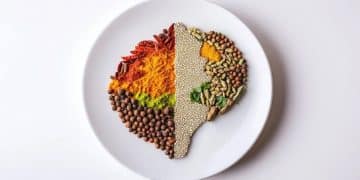Probiotics: Improve Gut Health, Boost Wellbeing

Probiotics are live microorganisms, primarily bacteria and yeasts, that can confer significant health benefits to the host, particularly by improving the balance of the gut microbiota and supporting overall physiological functions when consumed in adequate amounts.
In an increasingly health-conscious world, the quest for optimal well-being often leads us down paths less traveled by conventional medicine. One such fascinating journey is into the intricate universe of our gut, a complex ecosystem now recognized as central to virtually every aspect of our health. Within this microscopic world, The Power of Probiotics: How to Improve Your Gut Health and Boost Your Overall Wellbeing emerges as a compelling narrative, offering profound insights into transforming our internal landscape for a healthier, more vibrant life.
Understanding the Gut Microbiome: A Hidden Universe Within
The human gut is home to trillions of microorganisms, collectively known as the gut microbiome or microbiota. This diverse community, comprising bacteria, viruses, fungi, and other microbes, plays a far more significant role in our health than previously imagined. Far from being mere inhabitants, these tiny organisms are active participants in numerous physiological processes, influencing everything from digestion and nutrient absorption to immune function and even mood regulation. The delicate balance within this internal ecosystem is paramount; when it’s disrupted, a cascade of health issues can arise.
The concept of a balanced gut microbiome revolves around the predominance of beneficial bacteria over potentially harmful ones. A healthy gut is characterized by a rich diversity of microbial species, each contributing to the overall resilience and functionality of the system. This diversity is crucial for metabolic efficiency, including the fermentation of undigested food components, leading to the production of short-chain fatty acids (SCFAs) like butyrate, which are vital for colon health and systemic inflammation control. Furthermore, the gut lining, often referred to as the second brain, is protected and nourished by these microbial activities, preventing the leakage of toxins and undigested food particles into the bloodstream, a condition known as “leaky gut” syndrome.
Research continues to uncover the extensive reach of the gut microbiome. Its influence extends to the synthesis of essential vitamins, such as B vitamins and vitamin K, and the metabolism of bile acids and xenobiotics. Beyond these direct physiological roles, the gut-brain axis, a bidirectional communication pathway between the gut and the central nervous system, highlights the profound impact of our gut residents on brain function, including mood, cognitive abilities, and even behavioral patterns. Imbalances, or dysbiosis, in the gut microbiota have been linked to a wide array of conditions, from irritable bowel syndrome (IBS) and inflammatory bowel disease (IBD) to obesity, type 2 diabetes, allergies, autoimmune disorders, and various neurological conditions.
Maintaining this intricate balance is a continuous endeavor, influenced heavily by lifestyle choices, dietary habits, stress levels, and even medication use, particularly antibiotics. Understanding the foundational role of the gut microbiome empowers us to make informed decisions about supporting its health, and it’s within this understanding that the transformative potential of probiotics truly begins to shine as a powerful tool in fostering overall well-being.
What Are Probiotics? Defining the Beneficial Microbes
Probiotics are live microorganisms that, when administered in adequate amounts, confer a health benefit on the host. This definition, established by the World Health Organization (WHO) and the Food and Agriculture Organization (FAO), underscores their therapeutic potential. Essentially, probiotics are beneficial bacteria and yeasts that can help restore or maintain the natural balance of microorganisms in the gut. While millions of species exist, only specific strains have been rigorously studied and proven to offer specific health advantages.
The most common types of probiotics belong to the Lactobacillus and Bifidobacterium genera. These are the workhorses of the probiotic world, found in fermented foods and most dietary supplements. Each strain within these genera can offer distinct benefits, emphasizing the importance of choosing specific probiotics for particular health goals. For instance, Lactobacillus acidophilus is well-known for its role in supporting digestion and nutrient absorption, while Bifidobacterium lactis may be particularly effective in improving bowel regularity.
Key Probiotic Strains and Their Potential Benefits
Specific strains of probiotics have been linked to various health improvements. Identifying the right strain for your needs is important for maximizing efficacy.
- Lactobacillus Acidophilus: Often found in yogurt, this strain aids in lactose digestion and may help reduce symptoms of diarrhea.
- Bifidobacterium Bifidum: Supports the immune system and helps suppress harmful bacteria in the gut.
- Saccharomyces Boulardii: A beneficial yeast, effective in preventing and treating antibiotic-associated diarrhea and traveler’s diarrhea.
- Lactobacillus Rhamnosus GG (LGG): One of the most studied strains, beneficial for digestive health, immune support, and reducing the incidence of certain allergies.
Probiotics typically work by colonizing the gut, where they can outcompete harmful bacteria for nutrients and attachment sites on the intestinal wall. They produce beneficial compounds such as lactic acid, acetic acid, and specific enzymes that create an environment unfavorable for pathogens and support overall gut health. Furthermore, they can modulate the immune system, enhancing the body’s natural defenses against infections and reducing inflammatory responses. Their actions extend to reinforcing the gut barrier, reducing permeability, and improving the absorption of certain nutrients.
It’s crucial to understand that not all probiotics are created equal. The efficacy of a probiotic often depends on the specific strain, its viability (the number of live organisms), and the dose administered. Quality probiotic supplements will list the specific species and strains, along with the colony-forming units (CFUs) at the time of manufacture. While fermented foods are a natural source, the strain and number of viable organisms can vary significantly. Therefore, for targeted health benefits, a well-formulated probiotic supplement, chosen based on scientific evidence, might be more effective than relying solely on diet.
Benefits of Probiotics: Beyond Digestion
The benefits of probiotics extend far beyond mere improvements in digestive function, reaching into the realms of immunity, mental health, and even metabolic regulation. While their role in promoting a balanced gut environment is fundamental, the cascade of positive effects they initiate throughout the body is what truly underscores their power.
One of the most widely recognized benefits is their ability to alleviate various digestive issues. For individuals suffering from irritable bowel syndrome (IBS), probiotics can help reduce symptoms such as bloating, gas, abdominal pain, and irregular bowel movements. They achieve this by influencing gut motility, reducing visceral hypersensitivity, and modulating the inflammatory response within the gut. Similarly, probiotics are highly effective in preventing and treating antibiotic-associated diarrhea (AAD) by restoring the gut flora disrupted by antibiotic use. Certain strains have also shown promise in managing symptoms of inflammatory bowel diseases (IBD) like Crohn’s disease and ulcerative colitis, primarily by reducing gut inflammation and improving gut barrier function.
Probiotics and Immune System Fortification
The gut is often referred to as the largest immune organ, with approximately 70-80% of the body’s immune cells residing there. Probiotics play a pivotal role in training and strengthening this intricate immune system.
- Enhanced Immune Response: Probiotics can stimulate the production of antibodies and activate various immune cells, helping the body fight off infections more effectively.
- Reduced Inflammation: By influencing signaling pathways and producing anti-inflammatory compounds, certain probiotic strains help to calm systemic inflammation, a root cause of many chronic diseases.
- Protection Against Pathogens: Probiotics compete with harmful bacteria for resources and space, and some even produce antimicrobial substances that directly inhibit pathogen growth.
Beyond gut health and immunity, the emerging field of psychobiotics highlights the profound connection between the gut microbiome and mental well-being. Research suggests that probiotics can influence the gut-brain axis, potentially alleviating symptoms of anxiety, depression, and stress. They achieve this by modulating neurotransmitter production (like serotonin and GABA), reducing neuroinflammation, and influencing brain areas involved in mood regulation. This exciting area of research indicates that a healthy gut could be a cornerstone of mental resilience and emotional balance.
Furthermore, probiotics are being investigated for their role in metabolic health. Some studies indicate that specific probiotic strains may influence weight management, improve insulin sensitivity, and help regulate cholesterol levels, potentially offering new avenues for managing metabolic syndrome and type 2 diabetes. Their ability to influence nutrient absorption, energy metabolism, and even appetite could translate into tangible benefits for overall metabolic function. The comprehensive impact of probiotics underscores their potential as a holistic intervention for enhancing overall well-being.
Incorporating Probiotics into Your Daily Life: Food vs. Supplements
When considering how to integrate probiotics into your routine, you typically have two main avenues: naturally occurring sources through diet or concentrated probiotic supplements. Both offer distinct advantages and considerations, and the optimal approach often involves a combination of the two, tailored to individual needs and health goals.
Fermented foods are a traditional and delicious way to consume beneficial bacteria. These foods have been a part of human diets for millennia, long before the scientific understanding of probiotics emerged. The fermentation process not only preserves food but also enriches it with a diverse range of microorganisms.
Excellent Dietary Sources of Probiotics
While not all fermented foods contain live and active cultures by the time they are consumed, many do, offering a natural and holistic way to support your gut.
- Yogurt and Kefir: Dairy products fermented with specific bacterial cultures. Look for “live and active cultures” on the label.
- Sauerkraut and Kimchi: Fermented cabbage dishes that are rich in various lactic acid bacteria. Ensure they are unpasteurized to retain live cultures.
- Kombucha: A fermented tea beverage containing a symbiotic culture of bacteria and yeast (SCOBY).
- Tempeh and Miso: Fermented soybean products used in various Asian cuisines, offering a good source of probiotics for plant-based diets.
While dietary sources provide a natural and diverse range of microbes, the specific strains and their quantities can vary significantly. For targeted therapeutic effects or when addressing specific health conditions, probiotic supplements offer a more controlled and potent delivery system. Supplements allow for precise dosing of well-researched strains, often in much higher concentrations than what can be obtained through food alone.
When choosing a probiotic supplement, several factors are paramount. Firstly, look for products that specify the genus, species, and strain (e.g., Lactobacillus rhamnosus GG) on the label, as different strains offer different benefits. Secondly, check the Colony Forming Units (CFUs), which indicate the number of viable organisms. A typical therapeutic dose ranges from 1 billion to 100 billion CFUs. Thirdly, consider storage requirements; some probiotics need refrigeration, while others are shelf-stable. Lastly, consult with a healthcare professional to identify the most appropriate strain and dosage for your specific health concerns, especially if you have underlying medical conditions or are on medication. While food sources offer general gut wellness, supplements provide a more strategic and often necessary approach for those seeking specific health improvements.

Beyond Probiotics: The Role of Prebiotics and a Holistic Approach
While probiotics introduce beneficial bacteria to the gut, prebiotics serve as the essential nourishment that helps these good bacteria thrive. Prebiotics are non-digestible fibers that pass through the upper digestive tract undigested and reach the colon, where they are fermented by the gut microbiota. This fermentation process produces short-chain fatty acids (SCFAs), like butyrate, acetate, and propionate, which are vital for gut barrier integrity, immune function, and overall metabolic health. An optimal gut environment isn’t just about adding good bacteria; it’s also about fostering their growth and activity.
Incorporating prebiotic-rich foods into your diet is just as crucial as consuming probiotics. These foods include a wide array of fruits, vegetables, and whole grains.
Top Sources of Prebiotics
A diet rich in diverse plant-based foods is your best bet for a regular supply of prebiotics.
- Garlic and Onions: Rich in fructans, which are powerful prebiotics.
- Asparagus: Contains inulin, a type of fructan that selectively feeds beneficial bacteria.
- Bananas (especially slightly green): High in resistant starch, which acts as a prebiotic.
- Oats and Barley: Contain beta-glucans, fermentable fibers beneficial for gut health and immune modulation.
- Apples: Pectin in apples is a well-known prebiotic fiber.
Beyond the synergistic relationship between probiotics and prebiotics, a truly holistic approach to gut health encompasses several other crucial lifestyle factors. Diet, stress management, sleep, and physical activity all profoundly influence the composition and function of the microbiome. A diet rich in whole, unprocessed foods, abundant in fiber, fruits, vegetables, and lean proteins, provides the diverse nutrients that support a healthy gut ecosystem. Conversely, a diet high in processed foods, sugar, and unhealthy fats can lead to dysbiosis, promoting the growth of harmful bacteria and increasing inflammation.
Chronic stress is another major disruptor of gut health. The gut-brain axis ensures that psychological stress can manifest as digestive symptoms and alter microbial balance. Mindfulness, meditation, yoga, and spending time in nature are powerful tools for managing stress and, by extension, supporting gut well-being. Adequate and restorative sleep is also vital, as sleep deprivation can impact the gut microbiome and increase gut permeability. Regular physical activity has been shown to increase microbial diversity and improve gut function. Therefore, while probiotics and prebiotics are powerful tools, they are most effective when integrated into a broader lifestyle that prioritizes overall health and balance. It’s an ongoing commitment to nurturing this inner ecosystem that truly unlocks its full potential.
Potential Risks and Considerations When Taking Probiotics
While probiotics are generally considered safe for most healthy individuals, it is crucial to be aware of potential risks and considerations, particularly for certain populations or when initiating supplementation. Understanding these factors ensures a responsible and effective approach to integrating probiotics into one’s health regimen.
One of the most common side effects reported when first starting probiotics includes digestive discomfort. This can manifest as gas, bloating, or mild abdominal discomfort, which typically subsides as the body adjusts to the new microbial balance. These symptoms are often a sign that the beneficial bacteria are beginning to ferment fibers in the gut, producing gas as a byproduct. Starting with a lower dose and gradually increasing it can help mitigate these initial discomforts. Some individuals might also experience changes in bowel habits, either temporary constipation or diarrhea, which usually resolve within a few days to a week.
Who Should Exercise Caution?
While generally safe, certain groups should consult with a healthcare professional before taking probiotic supplements due to potential risks.
- Individuals with Compromised Immune Systems: People undergoing chemotherapy, organ transplant recipients, or those with severe immunodeficiency are at higher risk of infection when introducing live bacteria.
- Those with Severe Illnesses: Critically ill patients, especially those in intensive care units, may have an increased risk of bacteremia or fungemia (bacteria or fungi in the bloodstream) from probiotic use.
- Infants and Young Children: While some strains are safe for infants, specific recommendations and dosages should be followed, ideally under medical supervision.
- People with Short Bowel Syndrome: This condition can increase susceptibility to probiotic-related complications.
Another consideration is that the effects of probiotics are strain-specific and can vary from person to person. What works for one individual might not yield the same results for another, emphasizing the importance of personalized approaches and potentially trying different strains to find what works best. The quality and viability of probiotic products also vary widely; some products may not contain the stated number of live organisms or even the advertised strains. Therefore, choosing reputable brands that perform third-party testing and list specific strains and guaranteed CFUs at expiry is essential.
It’s also important to note that probiotics are not a magic bullet. They are a tool to support gut health, but they cannot fully compensate for an unhealthy diet or lifestyle. Serious underlying medical conditions should always be addressed by a healthcare professional. Therefore, while the benefits of probiotics are compelling, a cautious and informed approach, coupled with professional guidance when necessary, ensures that their integration into a health strategy is both safe and maximally effective. Regular consultation with a doctor, especially if you have pre-existing conditions or are on other medications, is always recommended before beginning any new supplement regimen.
The Future of Probiotics: Personalized and Precision Approaches
The field of probiotics is experiencing a rapid evolution, moving beyond broad-spectrum supplementation towards more personalized and precision-based approaches. As scientific understanding of the gut microbiome deepens, researchers are uncovering the intricate nuances of microbial interactions and their specific impacts on individual health outcomes. This paradigm shift promises to unlock even greater therapeutic potential, enabling tailored interventions that address specific health conditions with unprecedented accuracy.
Currently, much of the probiotic research focuses on identifying highly specific strains for particular ailments. Instead of a general “take probiotics for gut health” recommendation, the future will likely see prescriptions for “Strain X for IBS-D” or “Strain Y for anxiety.” This targeted approach is driven by advances in genomics and microbiome sequencing technologies, which allow scientists to precisely understand how individual strains interact with the host and whether they possess the desired therapeutic properties. For instance, specific strains are being investigated for their ability to combat obesity by influencing metabolism or to modulate neuroinflammation in neurological disorders like Parkinson’s disease.
Emerging Trends in Probiotic Research and Development
The frontier of probiotic science is buzzing with innovation, pushing the boundaries of what these tiny organisms can achieve.
- Psychobiotics: A burgeoning area focusing on strains that can influence the gut-brain axis to improve mental health conditions such as depression, anxiety, and even autism spectrum disorders.
- Postbiotics: Not live organisms themselves, postbiotics are the beneficial metabolic byproducts produced by probiotics (like short-chain fatty acids, enzymes, and peptides). They offer a way to deliver beneficial compounds without introducing live bacteria, potentially useful for immunocompromised individuals.
- Fecal Microbiota Transplants (FMT): While not a probiotic in the traditional sense, FMT involves transferring fecal matter from a healthy donor to a recipient to restore a balanced microbiome. This highly effective procedure for recurrent Clostridioides difficile infection is now being explored for various other conditions, including inflammatory bowel disease.
- Designer Probiotics: The use of genetic engineering to create probiotics with enhanced or novel functions, such as producing specific therapeutic proteins or targeting particular pathogens.
The concept of a “one-size-fits-all” probiotic is rapidly becoming obsolete. Future approaches will likely involve a combination of detailed microbiome analysis (using stool samples to map an individual’s unique gut flora) followed by personalized recommendations. This could mean a customized blend of probiotic strains, possibly combined with specific prebiotics, tailored to an individual’s unique microbial composition and health needs. Such precision medicine promises to maximize the efficacy of probiotic interventions while minimizing potential adverse effects.
Furthermore, the integration of artificial intelligence and machine learning is poised to revolutionize the field. These technologies can analyze vast datasets from microbiome studies, identifying complex patterns and predicting optimal probiotic interventions for diverse health conditions. This will lead to more sophisticated diagnostic tools and highly individualized treatment plans. While challenges remain—such as ensuring sustained viability of strains, optimizing delivery methods, and navigating regulatory pathways—the future of probiotics is undoubtedly geared towards a more intelligent, targeted, and powerful approach to health and well-being.

| Key Point | Brief Description |
|---|---|
| 🦠 Gut Microbiome | Trillions of microorganisms influencing digestion, immunity, and mood. |
| 🍎 Probiotics & Prebiotics | Probiotics add good bacteria; prebiotics nourish them for optimal gut health. |
| 🛡️ Immune Boost | Probiotics help fortify the immune system, reducing inflammation and fighting pathogens. |
| 🧠 Gut-Brain Axis | Healthy gut flora can positively impact mental well-being, mood, and stress. |
Frequently Asked Questions About Probiotics
▼
Probiotics are live beneficial microorganisms, typically bacteria or yeasts, that contribute to gut health when consumed. Prebiotics, on the other hand, are non-digestible fibers that act as food for these beneficial gut bacteria, stimulating their growth and activity. Both are essential for a balanced and thriving gut microbiome.
▼
The time frame for probiotics to show effects varies significantly depending on the individual, the specific probiotic strain, the dosage, and the health condition being addressed. Some individuals may notice improvements within a few days, while for others, it might take several weeks to observe significant changes in symptoms or overall well-being.
▼
Most healthy individuals tolerate probiotics well. Common initial side effects can include mild digestive upset like gas, bloating, or temporary changes in bowel habits, which usually subside as the body adjusts. Individuals with compromised immune systems or severe illnesses should consult a doctor before taking probiotics due to a higher risk of complications.
▼
While fermented foods like yogurt, kimchi, and kefir are excellent natural sources of probiotics, the specific strains and quantity of live cultures can vary widely. For targeted health benefits or higher therapeutic doses, probiotic supplements may be more effective. Relying solely on food sources might not provide the specific strains or consistent CFUs needed for certain conditions.
▼
For general gut health, commonly recommended strains include Lactobacillus acidophilus, Bifidobacterium lactis, and Lactobacillus rhamnosus GG. A multi-strain probiotic supplement that combines several well-researched strains from both Lactobacillus and Bifidobacterium genera can offer a broader spectrum of benefits for maintaining a balanced gut microbiome.
Conclusion
The exploration into the universe of our gut microbiome reveals a compelling truth: our internal ecosystem profoundly influences our entire being. The Power of Probiotics: How to Improve Your Gut Health and Boost Your Overall Wellbeing is not just a trend; it represents a significant shift in understanding health, emphasizing the foundational role of a balanced gut. By consciously incorporating probiotics—whether through nutrient-dense fermented foods or targeted, high-quality supplements—and complementing them with prebiotics and holistic lifestyle choices, we embark on a transformative journey. This journey promises not only improved digestion and immunity but also enhanced mental clarity, emotional balance, and sustained vitality, equipping us with proactive tools to foster a more resilient and vibrant self in an ever-evolving world.





